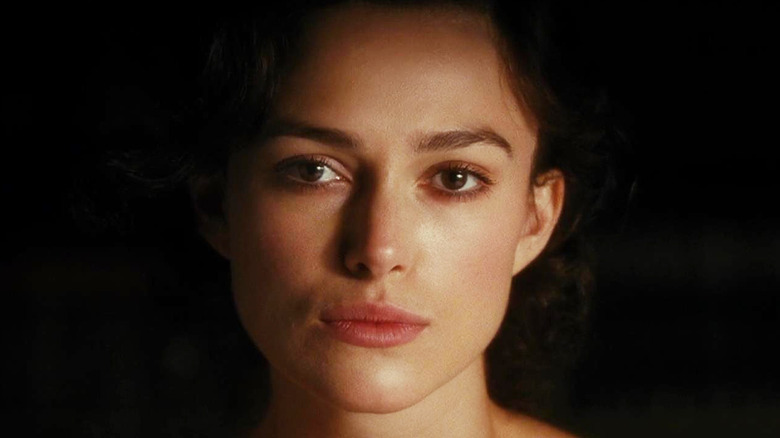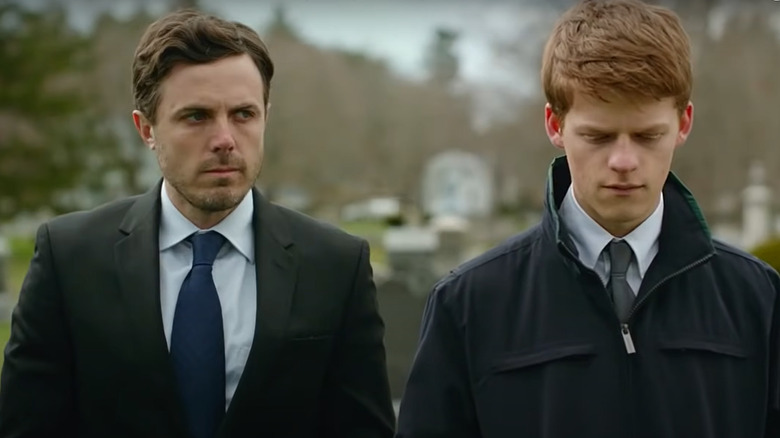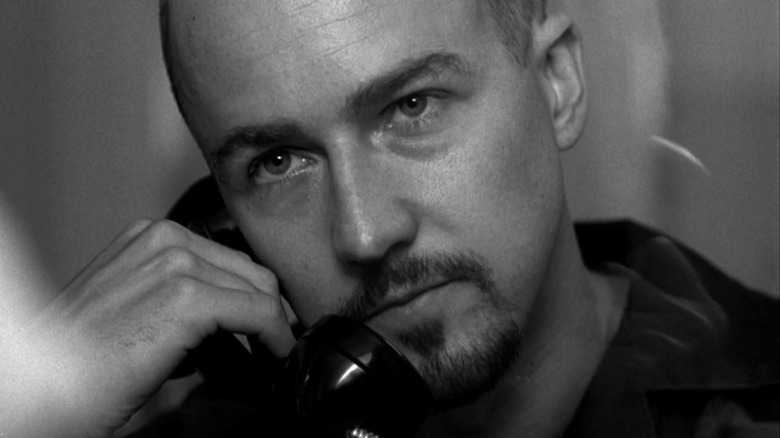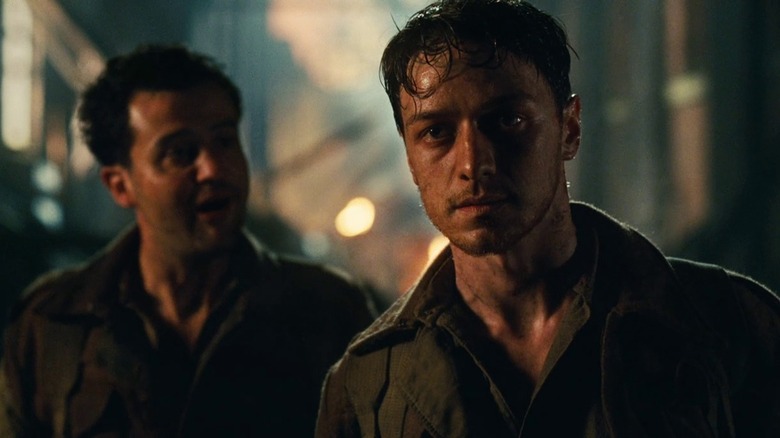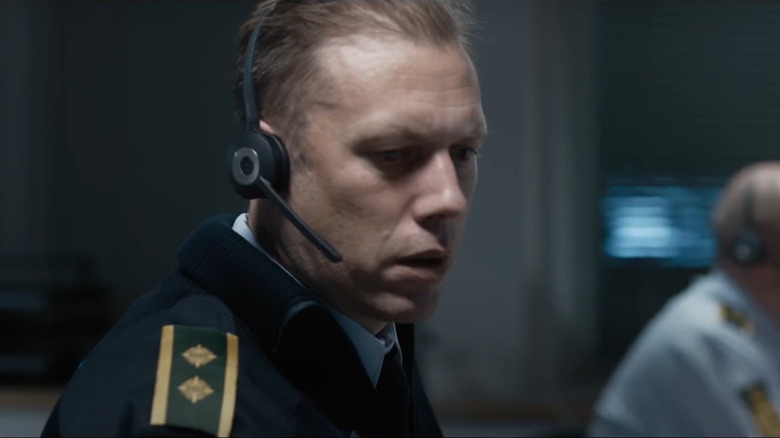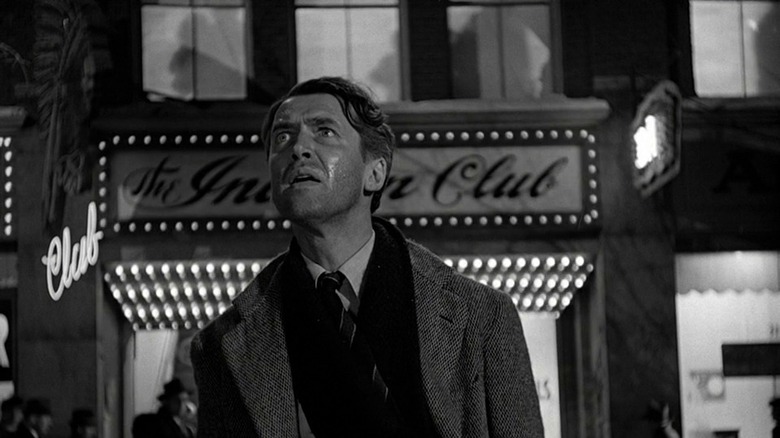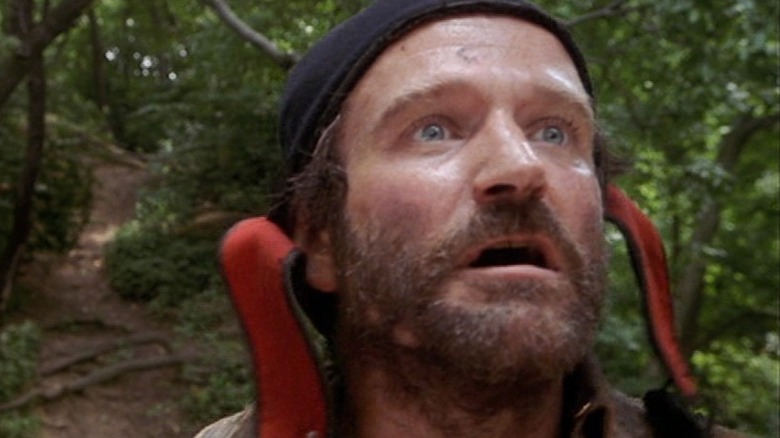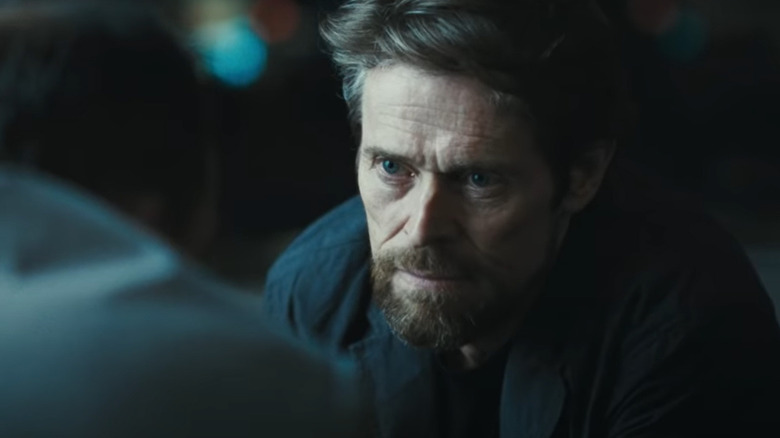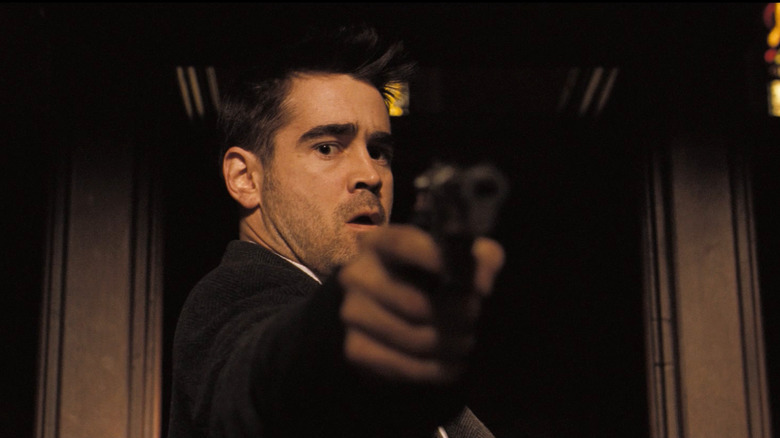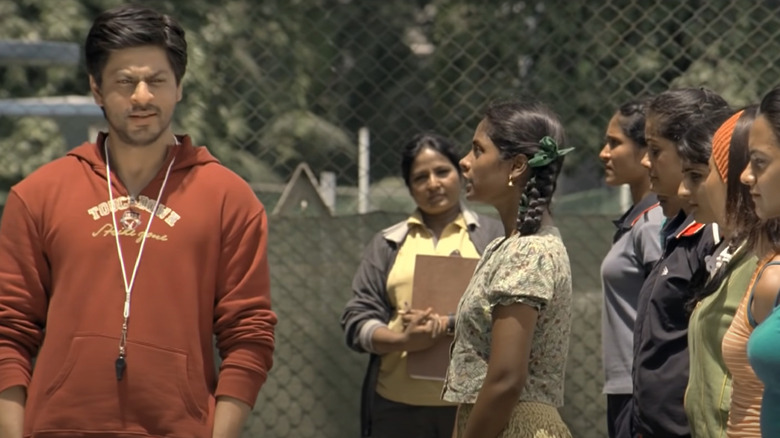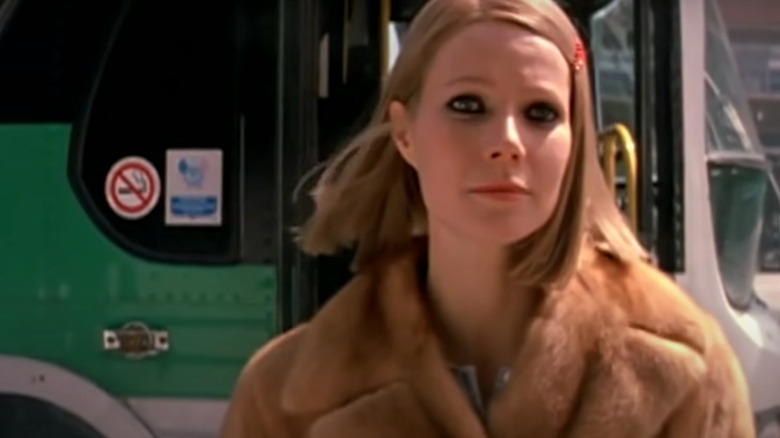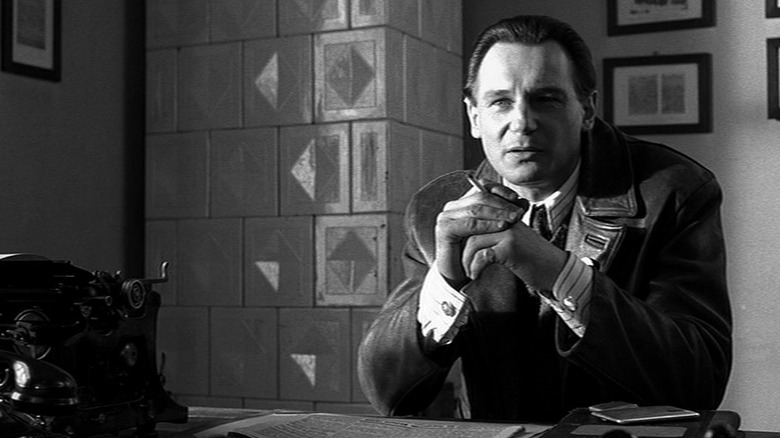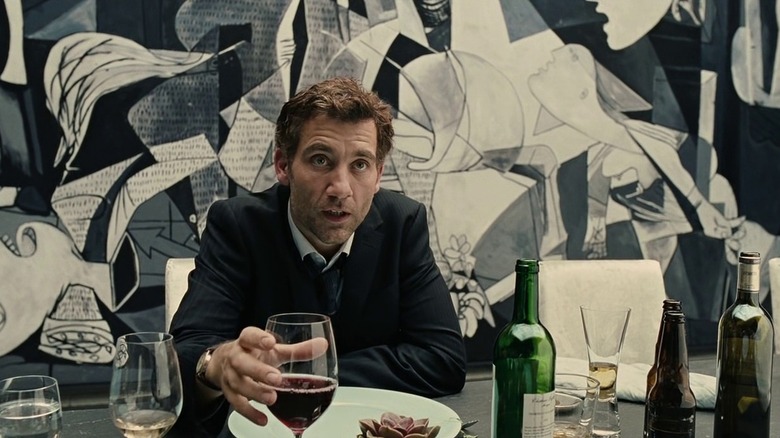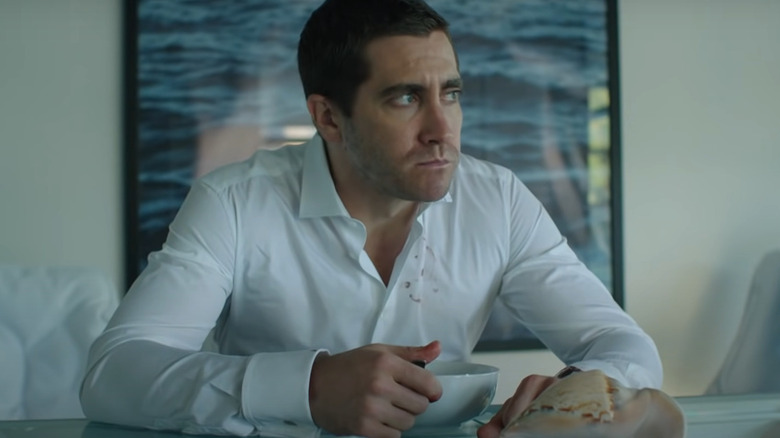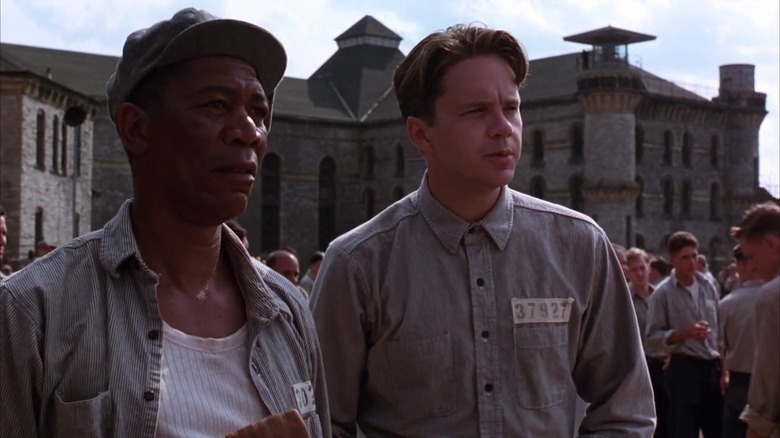15 Movies About Redemption That Everyone Needs To Watch
Movies about redemption are studies in hope. What could be more optimistic than a universe where no one and nothing is irredeemable, after all? But beyond this, the meatiest part of any redemption film is its characters. With its morally ambiguous protagonists, conflicted villains, and implicated bystanders, the cinema of redemption holds a mirror up to humanity in a uniquely poignant way.
Moreover, this motif has great versatility. Themes of redemption can be subsumed into any genre, from thrillers to comedies to dramas. Redemption movies can also follow any course. In some, the redemption arc is fairly obvious from the get-go. In others, it remains subtle, and even surprising. The act of redemption itself can have multiple meanings: It might bring salvation for a previously committed transgression, a religious purging of sin, or something else altogether. Interested in seeing characters grow beyond their worst days? Then you need to watch these 15 movies, which beautifully and accurately capture the spirit of redemption.
Manchester by the Sea
Redemption is hardest to attain when you think yourself unworthy of it, as Lee Chandler (Casey Affleck), the protagonist of "Manchester by the Sea," does. A traumatic incident in his past has left him so full of grief and guilt, there couldn't possibly be room for any other strain of emotion left. He's now an early-onset curmudgeon who funnels his angst into bar brawls and squabbles with the tenants of the building he works in. But Lee is jolted out of this bitter reverie by the news of his brother Joe's (Kyle Chandler) death, and his newfound role as guardian to Joe's son Patrick (Lucas Hedges).
From the start, "Manchester by the Sea" makes it apparent that Lee is beyond conventional redemption. His grief will not shrink in size with each passing day. Since he can't outgrow his despair, the movie gives him a fighting chance of growing around it through his relationship with Patrick. What results is a movie that challenges the very meaning of redemption and stands as a sterling example of the cinema of self-transformation.
American History X
Horrifically, the relevance of 1998's "American History X" only compounds with each passing year. This movie gives us an unflinching look at white supremacist movements through the perspectives of neo-Nazi figurehead Derek Vinyard (Edward Norton) and his younger brother Danny (Edward Furlong). After a stint in prison, Derek emerges a transformed man, free of his previous fanaticism. But the "Mein Kampf"-spouting Danny seems poised to plummet into hate-mongering and repeat his brother's mistakes. It's now up to Derek to break the cycle of hate that runs through the Vinyard household.
This searing movie portrays the brothers' vicious ideology as the biggest enemy of transformation. As Derek's character arc shows us, to be free of this hatred is to be open to change — but the road is difficult, and plenty of people don't want to walk down it. Perhaps the most radical part of "American History X" isn't Derek and Danny's extreme ideology, but the movie's belief in their ability to redeem themselves.
Atonement
Imagination is a powerful tool, especially in the hands of a child. In "Atonement," young Briony Tallis (Saoirse Ronan) has an imagination so fertile that it produces beautiful fiction — and also ruins an innocent man's life.
Briony harbors a crush on the groundskeeper's older son Robert "Robbie" Turner (James McAvoy). He, on the other hand, is far too busy developing his own love story with Briony's sister Cecilia (Keira Knightley), who wholly reciprocates his feelings. Briony spies Robbie and Cecilia growing close to each other, and her childish naivete interprets what she sees as Robbie attacking her sister. When an actual sexual offense occurs, Briony has no trouble (mis)identifying the culprit as Robbie, who is quickly arrested and sent to prison.
Now, Briony's case of mistaken identity can be called a lie only insofar as the person she's lying to is herself. But her self-deception doesn't last long, and soon, she's pondering ways to atone for her mistake and make things right for Robbie and Cecilia. What should Briony's atonement for telling such a lie be? How does one even atone for such a brutal act of self-deception? "Atonement" masterfully wrings a thought experiment about guilt and forgiveness out of this question.
The Guilty
If there's a case to be made for minimalist filmmaking, "The Guilty" is exhibit A. (We're referring to the original Danish version, not the lesser American remake.) This movie extracts all the possible thrills it can from the claustrophobic confines of an office. Moreover, it does this while managing to deeply meditate on themes of morality and guilt.
The main subject of "The Guilty" is police officer Asger Holm (Jakob Cedergren), who is temporarily relocated to the emergency services department pending investigation of his involvement in a serious incident. Asger is more distressed over this unstated episode than the emergency callers are over their own dilemmas — until a woman named Iben Østergård (Jessica Dinnage) dials in, claiming to be kidnapped. Asger takes more interest in her case than all his previous callers combined. In fact, his stake in the ordeal seems wildly disproportionate. Soon, it becomes apparent that he views Iben's case as his chance to redeem himself for committing the (yet unmentioned) offense. A thrilling ride into the psyche of one very guilty man, this one's a must-watch.
It's a Wonderful Life
Redemption movies needn't be all thought and no heart. George Bailey (James Stewart), the protagonist of "It's a Wonderful Life," is proof: He's an idealist who believes that the individual is just one small part of the much bigger whole that is their community. This belief leaves him with a pathological condition, however — he can't stop doing good unto his family and friends. When an unfortunate turn of events causes George's reserves of charity to become exhausted, things come to a grievous head. He's hardly in need of moral or religious absolution, though. What he needs is relief from an acute case of disillusionment and world-weariness.
The citizens of Bedford Falls, many of whom are indebted to George for his kindness, move Heaven and Earth (almost literally) to help him. Their prayers work: Divine intervention arrives and gives George a glimpse into a universe where he doesn't exist. This allows him to appreciate his existence and the value it continues to add to his beloved town. In "It's a Wonderful Life," redemption comes from seeing the good in yourself reflected in the world around you. As George's father Peter Bailey (Samuel S. Hinds) would say, "All you can take with you is that which you've given away." Thus, "It's a Wonderful Life" conclusively proves its title.
The Fisher King
"The Fisher King" brings Terry Gilliam's characteristic imagination and tragicomedy to an intense story of redemption. Jack Lucas (Jeff Bridges) is a shock jock whose callous and incendiary comments drive a man to kill himself and seven others. He descends into a drunken stupor, only to be revived by a vagrant named Parry (Robin Williams).
Parry lives in an imagined Arthurian legend where he's a knight tasked with finding the Holy Grail. When he employs Jack's help to seek out the Grail, redemption is made almost tangible. As it happens, Parry and Jack are connected in more ways than one: Parry's wife perished in the mass shooting Jack's comments provoked. Jack thus believes absolution for his misdeeds is just one Holy Grail away, and resolves to help Parry complete his mission. If seeing the concept of redemption reflected through the prism of magical realism is something that sparks your interest, "The Fisher King" should be next on your list.
The Hunter
"The Hunter" is centered around Martin David, an assassin with a most unique and elusive target: The Tasmanian tiger, thought by many to be extinct. A biotech corporation knows differently, however, and will stop at nothing to get its hands on samples of the creature. So, Martin is dispatched to Tasmania, where he lives with a local family and disguises himself as a biologist as he tracks the evasive beast.
We know next to nothing about Martin's past, relying instead on the present to gain insight into his nature. As he settles into his role as a "biologist," we start to see a different side to him that's quite unlike the cold, unfeeling mercenary. He's not immune to empathizing with the hardships of a family and community torn apart by money-hungry corporations looking to exploit their natural resources. Eventually, Martin struggles to reconcile his mission with this newfound sense of justice. At first glance, you may think "The Hunter" pits man against nature. In reality, it pits man against human nature and his own conscience.
In Bruges
Few characters on this list are as in need of redemption as mercenaries Ken Daley (Brendan Gleeson) and Ray (Colin Farrell). The latter is particularly desperate, as he's just committed a crime even his fellow hitmen can't condone. The act in question takes place in a confessional, where Ray seeks absolution from a priest before murdering him — and accidentally wiping out a child in the process. Soon after, Ray is shipped off to Bruges with Ken to await word from their handler. The more time he spends in Bruges, the more the city becomes his own personal purgatory, where he contemplates his poor life choices as a vague form of penance.
Like a majority of the films on this list demonstrate, a story about profound rehabilitation seldom has room for humor. But the deathly serious redemption arc of "In Bruges" plays out against a chaotically hilarious series of events. Ray ends a dinner outing with two knockout punches, a date transforms into a robbery, a film shoot is interrupted by a shootout — and that's just for starters. For fans of both the black comedy genre and redemption themes, "In Bruges" is a winner.
Chak De! India
Sports drama "Chak De! India" is a crucial part of the Bollywood canon. All that comes between star hockey player Kabir Khan (Shah Rukh Khan) and the World Cup title is a few inches of field — as in, he misses a decisive penalty shot by precisely that much. To his unforgiving countrymen, that gap may as well have been measured in lightyears. But the world of sport is uniquely generous, insomuch as it allows its players redemption: There's always the next match or game. And so, some years later, Kabir Khan returns to the hockey field — but this time, in the capacity of a coach to the national women's hockey team. This team, which is nothing if not ragtag, has a reputation for being as fallible as Kabir. Its players hail from various pockets of India, but they don't see diversity in each other, just differences. The only common thread binding them together is their shared plight: They're all on the sinking ship that is their hockey team.
But Kabir is no defeatist. Slowly but surely, he attempts to perform a makeover of this team, transforming them into a cohesive group of genuine winners. All of this serves to demonstrate that redemption is not a solitary act. Often, it's the result of an enthusiastic and allied effort.
The Royal Tenenbaums
"The Royal Tenenbaums" bears all the trademarks of a classic Wes Anderson film. It's got whimsy, irony, and heaps of comedy — plus some very thoughtful things to say about the concept of redemption. The eccentric Royal Tenenbaum (Gene Hackman) and his wife Etheline (Anjelica Huston) rear a brood of child prodigies: Chas (Ben Stiller), Margot (Gwyneth Paltrow), and Richie (Luke Wilson). For the patriarch of a family of geniuses, Royal has very little knowledge of his own flesh and blood — and he doesn't care to gain any. He soon leaves his family to pursue his other interests, which happen to be philandering and thieving.
Cut to 22 years later, and the tide has turned for the Tenenbaums: The child prodigies have grown into average adults, and Royal has fallen out of everyone's good graces. Etheline, however, is engaged to be married to a man who loves her. A jealous Royal invites himself back into the family and tries to win back the goodwill of his ex-wife and children. In this manner, "The Royal Tenenbaums" portrays loss and redemption through a heartfelt — if slightly eccentric — story about family and its many dysfunctions.
Drive My Car
Language and communication — or a lack thereof — connects the myriad characters of "Drive My Car." This stirring movie centers around an international theatrical production that doesn't just break language barriers, it thinks beyond them completely. It's ironic then, that communication is such a travesty for its actors, and, most importantly, its grieving director, Yusuke Kafuku (Hidetoshi Nishijima).
The sudden death of Yusuke's wife has left him feeling aloof and guilt-ridden. The only person he manages to connect with is his young chauffeur Misaki Watari (Tōko Miura), who is haunted by her mother's death, years after the fact. Over the course of "Drive My Car," the duo covers the distance between remorse and deliverance by confiding and finding comfort in each other. In the end, Yusuke's car becomes a vehicle (pun intended) for the connection, confessions, and confrontations that elude so many other characters — and so many people all over the world.
Schindler's List
"Schindler's List" is not only a movie that features prominently on lists of the best movies about redemption, it's widely regarded as one of the best movies ever made. The titular Oskar Schindler (Liam Neeson) starts out as a German business magnate who pledges allegiance to no ideology but that of capitalism. The Nazi mission of Jewish genocide doesn't hold any significance to him, but he allies with the group for the sake of business. But a jarring sight sensitizes him to the plight of the Jewish community: He witnesses a young girl in a red coat meeting a tragic fate at the hands of the Nazis. Thereafter, he forsakes profit in favor of helping the Jewish people.
A story about reformation becomes that much more hopeful when it's true, and "Schindler's List" bears the distinction of being the only movie on this list that is almost entirely derived from real life. The human capacity for change triumphing in the face of a great evil like the Nazi regime makes for a truly great story about hope and redemption.
Children of Men
Widely considered one of the greatest sci-fi movies of all time, "Children of Men" depicts a spiritual redemption with uncommon intensity. After the death of his son, ex-activist Theo Faron (Clive Owen) becomes a frail, tired husk of his former self. The rest of the world is in a similar state of melancholy: A mysterious defect has cost humanity its ability to reproduce. Without a new generation to move it forward, society stagnates and is stripped of everything that is new and hopeful. In the midst of this chaos and breakdown, a woman named Kee (Clare-Hope Ashitey) becomes pregnant. It falls to Theo to transport her to safety.
Several outlets, including The Take, have found allegories to Christian mysticism within "Children of Men." Indeed, Biblical motifs of apocalyptic times and salvation through hope and faith ring loud and clear. In a world bereft of hope, Kee's miracle pregnancy becomes humanity's absolution. "Children of Men" succeeds in finding redemption where there seems to be none to spare.
Demolition
"Demolition" examines the aftermath of a person's life and death through their spouse's eyes. Married couple Davis (Jake Gyllenhaal) and Julia (Heather Lind) spend their daily commute bickering about something inconsequential. Suddenly, a freak car accident claims Julia's life, but leaves Davis unharmed. Her death has a strange impact on him: It leaves a gaping hole where his feelings and emotions should be.
Davis contends with this numbness in an even more bizarre way. To him, rebuilding his life after Julia's death means taking everything apart, piece by piece — and we mean that entirely literally. He detaches, disassembles, and even destroys a wide variety of objects. "Demolition" is certainly not coy about its metaphors: At one point, Davis' father-in-law Phil Eastwood (Chris Cooper) compares mending the heart to dismantling, examining, and repairing an automobile. Grief and rehabilitation can take several different forms, and in this dramedy, they become destruction.
The Shawshank Redemption
There would be no redeeming this list if it failed to mention a film as important as "The Shawshank Redemption." This prison drama has been sitting comfortably atop the IMDb charts forever, and is a favorite of people all over the world. Our redemption tale unfolds at the titular Shawshank State Prison, where accountant Andy Dufresne (Tim Robbins) is the newest inmate on the block. With two life sentences to his name, he has no choice but to reluctantly embrace his new existence. He becomes fast friends with inmate Red (Morgan Freeman) and an accomplice to a money-laundering scheme perpetrated by Warden Samuel Norton (Bob Gunton).
But Andy's contributions to Shawshank don't stop there. To his fellow inmates, he preaches a message of hopefulness for life after prison, even succeeding in turning cynical Red into something of a believer. Without hope, there can be no absolution for either of them. Said absolution has a place and name: Zihuatanejo. Andy claims that memory doesn't exist in this Mexican town — it cleanses its inhabitants of their sins. The hope it represents is potent enough to carry him through his darkest years, into a future cradled by the Pacific Ocean.
